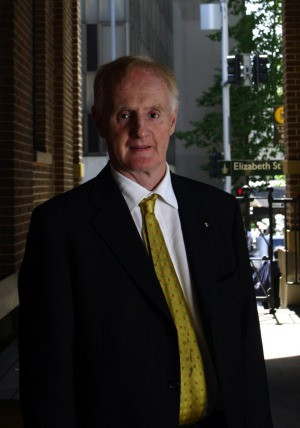
The new arrangement threatens eight peak bodies, with 200,000 members.
The former chairman of the United Nations committee representing people with disabilities has added his voice to the chorus of anger over the government's shake-up of the sector, challenging its claim it is in acting in accordance with the UN convention.
Ron McCallum, who is blind, is a former dean of law at Sydney University and, until December, was chair of the United Nations Committee on the Rights of Disabled Persons in Geneva. He condemned the federal government's action, saying it revived old, outdated attitudes that those with disabilities were not people with rights but "objects of charity".
Last week the Department of Social Services announced it would fund an alliance of five groups representing disabled people by demographic rather than specific need, plus one service provider.
This threatens eight peak bodies with 200,000 members with intellectual disabilities, physical disabilities and sensory disabilities including blindness and deafness. It also cut the amount of funding available by 40 per cent, to $3.6 million. The assistant minister for social services, Mitch Fifield, claimed the new arrangement was consistent with the UN Convention on the Rights of Disabled Persons.
But Professor McCallum rejected this, saying the government does not accord with Article 33, relating to monitoring and implementing the convention. "[Senator Fifield] can't rely on the convention to say it approves of what he's doing. He's trying to mask cutting groups and the convention doesn't justify that. He can't use it as a crutch," he said.
"This defunding strategy hearkens back to the era when persons with disabilities were viewed as objects of charity. I thought that with Australia's ratification of the disabilities convention and the establishment of the National Disability Insurance Scheme, the old, outdated charitable model had been put to bed." Professor McCallum said advocacy groups run for and by people with disabilities must be properly funded to uphold their human rights.
But the assistant minister for social services, Mitch Fifield, said the new alliance provided representation for people with a disability, regardless of their diagnosis. "This approach is consistent with the United Nations Convention on the Rights of Persons with Disabilities".
Last week the former federal disability commissioner and co-author of the Convention, Graeme Innes, joined advocates in attacking the cuts, saying it constituted a breach. Campaigners also said the move would exacerbate tensions in the sector as groups receiving funding must represent people with specific needs – despite not having the experience or resources to do so.
Craig Wallace, president of People With Disabilities Australia, which received funding, said while he recognised many organisations faced major challenges following the cuts, the new model allowed "representation and a voice, for people with disabilities, that have been missing all the way through".
While confident his organisation could absorb some of the extra load caused by the funding cuts to other groups, he suggested the government advisory role of peak bodies was being confused with the need for peer support for people with specific disabilities – which is meant to be provided through the National Disability Insurance Scheme.
"Peer support is important for people with different disabilities but it is a different thing to peak body representation, which is about delivering coherent professional advice to government."
On Thursday, the Senate voted to hold an inquiry into the Department of Social Services' grants funding system. Rachel Siewert, the Greens' spokeswoman on family and community services, who put forward the motion, said the inquiry would investigate where and why cuts had been made in the "shambolic" process.